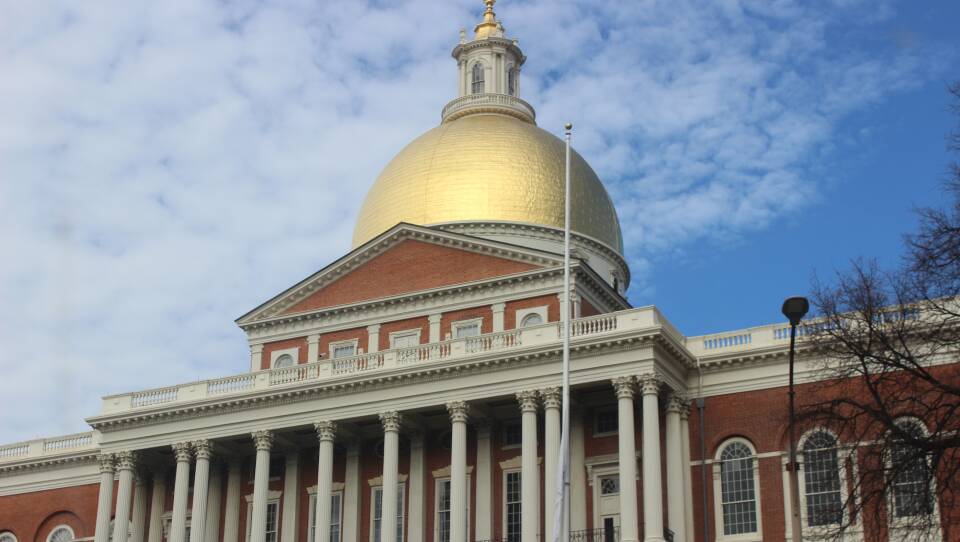Despite sympathy among the 117 House Democrats for immigrant families being separated along the southern border, House Speaker Robert DeLeo reemphasized Wednesday that it would still prove "difficult" for him pass legislation through the chamber aimed at curtailing the reach of Immigration and Customs Enforcement (ICE) in Massachusetts.
DeLeo, a moderate Democrat from Winthrop, acknowledged that the issue has sparked great interest and debate on Beacon Hill this year. The Senate, which is also under the control of Democrats, have passed a measure aimed at serving as a check on aggressive tactics used by ICE.
But even after protesters stormed the State House on Tuesday threatening to vote lawmakers out of office if they fail to act on immigration, the speaker remained skeptical on Wednesday.
"I feel that it is something that, as we're standing here right now, if you were to say take a bill to the floor and to try to get a bill passed I think it would be very difficult," DeLeo told reporters.
A permanent budget for fiscal year 2019 is now 11 days late as Massachusetts remains the only state in the country without a budget in place for next year.
While leaders refuse to discuss what's holding up an agreement, the Senate passed a controversial amendment to its version of the budget in May that would prohibit local law enforcement from entering collaboration agreements with ICE and generally prevent police from inquiring into people's immigration status. Gov. Charlie Baker has threatened to veto it.
"There is sufficient interest. The question is how do you get there, and I think that's the biggest issue we have," DeLeo said. "People, obviously, bleed, their hearts bleed when they hear stories about, obviously, a child separated from the parent, but when you start talking about some of the other immigration issues that's where I think people are pretty much in many different places."
The immigration debate has also put House Ways and Means Chairman Jeffrey Sanchez in a difficult position.
Sanchez was a co-sponsor in the House of the "Safe Communities Act," on which the Senate budget amendment was modeled, and he has drawn a primary challenge from Democrat Nika Elugardo, who has made immigration a major campaign issue.
Asked whether he felt torn between his Jamaica Plain constituents and his duties as Ways and Means chair, the veteran Puerto Rican lawmaker's tone turned serious.
"When it comes to immigrants, what's happening on the border resonates across the globe and it resonates with everyone inside of this building. I think everybody understands where my commitment lies and how I feel personally on this and we're having the conversations, as you see, as the speaker has mentioned, and we'll continue to have conversations," Sanchez said.
Pressed on whether he felt conflicting allegiances, Sanchez said, "I stand in front of my constituents every single day and I represent them as proudly as I possibly can with my heart, every single day."
"What we should be doing"
Sanchez met face-to-face with the Senate's lead negotiator Ways and Means Chairwoman Karen Spilka on Tuesday, and he said conversations continue between the staff despite the lack of an accord.
"We've been working at it, chipping away at it. Our staffs are going back and forth. It's exactly what we should be doing," he said.
According to the Massachusetts Taxpayers Foundation, budget negotiators face 185 non-spending Senate initiatives and 109 from the House. And while total spending in the two roughly $41.5 billion budgets differs by only $22 million, the budgets feature $304 million in unique House spending and $282 million in unique Senate spending, for a total of $586 million.
DeLeo on Monday suggested the conference committee consider dividing questions of policy from the nuts-and-bolts spending in the budget bill in order to reach an agreement more quickly, but it does not appear that he has insisted on taking that approach.
"It takes two to tango," DeLeo said.
The House also included policy proposals in its budget, such as new oversight of the State Police.
"The Senate does not agree to separate revenues out from policy," Spilka told the News Service Wednesday afternoon. "I believe this year isn't any more complicated than last year with no more policy or difficult budget challenges. In fact, last year was probably more challenging."
The Ashland Democrat, who will soon ascend to the Senate presidency, declined to discuss what issues might be holding up a budget deal or whether she was insisting on an immigration agreement as part of the budget, but she said separating policy from the spending bill would be "both unprecedented and unnecessary."
"I believe we can, should and will reach a consensus budget that addresses all the issues before us," Spilka said.
Sanchez declined to say whether he had tried to convince the Senate to move forward without policy riders.
"I can't get into the individual details, but I feel optimistic. The conversations have been going well," he said.
Asked if he was embarrassed by Massachusetts' status as the only state without a budget, DeLeo said not embarrassed, but "disappointed."
"I think it's important for the fiscal stability of the commonwealth that we get this done," he said.




